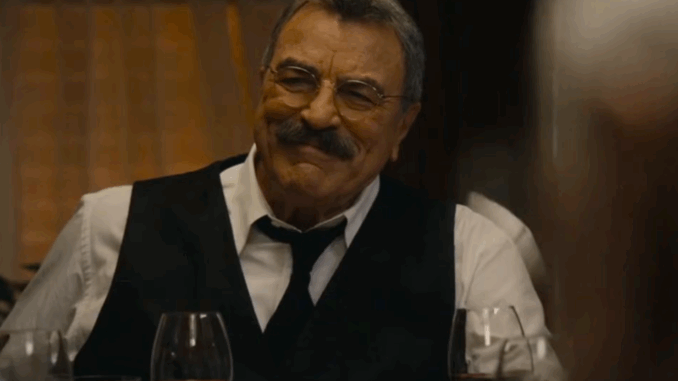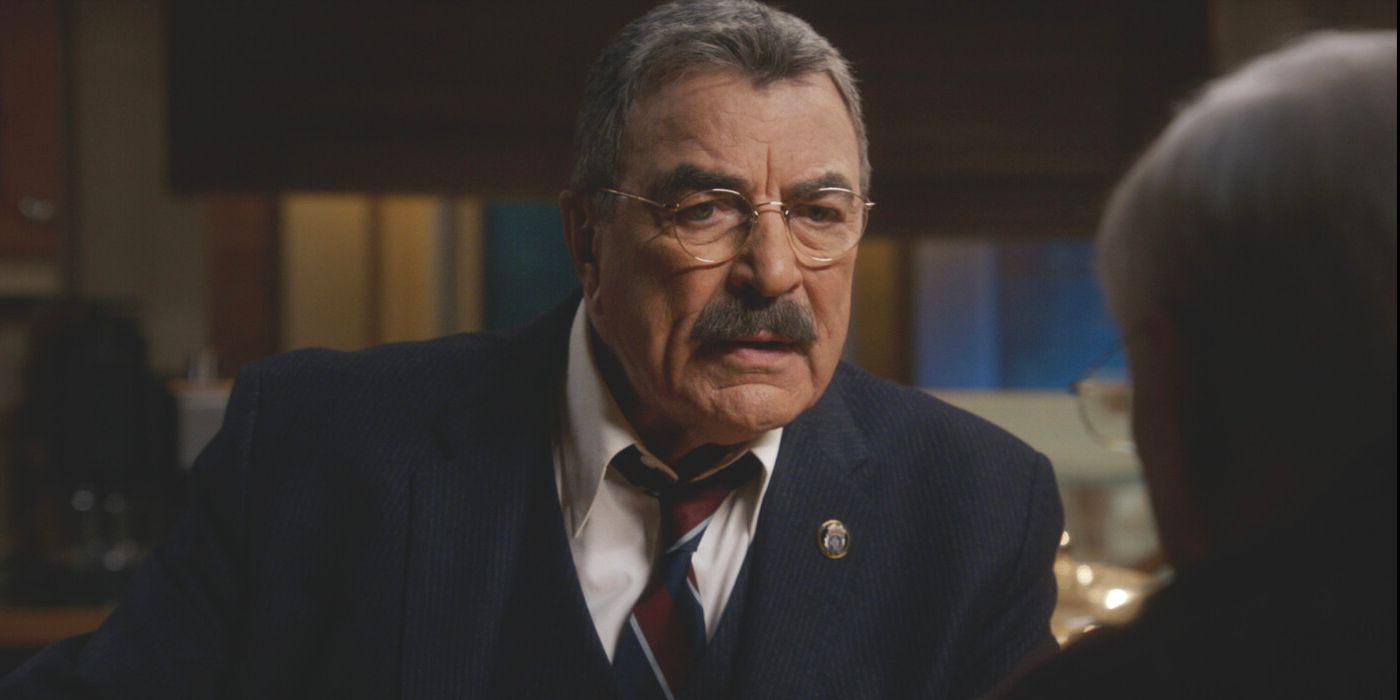
After 14 seasons, Blue Bloods has finally closed its last case. The long-running CBS procedural carved out a unique place in the cop drama genre. It blends law enforcement and family loyalty into a reliably steady formula. While the Reagans gathered every week around the dinner table, not everything was tied up so neatly.
Fans stuck with the show for over a decade through promotions, retirements, character exits, and endless moral debates. Yet when the series finale aired, it left behind more than a few dangling plot threads. Some characters disappeared without explanation. Others never receive closure. Certain backstories were hinted at but never explored.
10
Jamie and Eddie’s Future Is Unclear
The Fan-Favorite Couple Never Gets the Spotlight They Truly Deserve
When Blue Bloods finally paired Jamie Reagan (Will Estes) and Eddie Janko (Vanessa Ray) as partners and then spouses, it marked a significant shift for the series. Fans welcome the transition because of the years of slow-burn romance. However, after their wedding, their storylines steadily faded into the background, and the show never fully explored the implications of their marriage on the job or at home.
Would they ever consider starting a family? Would one of them eventually leave the force or change departments to avoid a conflict of interests? These big-picture questions lingered throughout the final seasons, with occasional tension but no significant payoff. The finale offers no real closure or a major turning point. It just gave more of the same vague status quo. Blue Bloods leaves one of its most promising couples stuck in neutral.
9
What Really Happened to Joe Reagan Is Never Answered
Joe’s Death Remains a Narrative Ghost Haunting the Series
From the very beginning, the death of Joe Reagan shapes the emotional and moral backbone of Blue Bloods. Killed in the line of duty by corrupt cops, his story is what brings Jamie (Will Estes) into the NYPD and continually strengthens Frank’s (Tom Selleck) commitment to integrity. Despite the setup, Joe’s death remains frustratingly vague throughout the series.
There are occasional flashbacks, references, and even the introduction of his son, Joe Hill (Will Hochman), but the show never fully fleshes out who Joe was as a person. How did he discover the corruption? What really happened in his final days? By series’ end, Joe still feels more like a symbol than a character. Fans hoping for a detailed look into the case that started it all are left wanting. For a show so centered on legacy, the lack of resolution around Joe Reagan’s story remains a significant omission.
8
Nicky’s Sudden Disappearance Lacks Closure
A Core Reagan Family Member Fades Out With No Real Goodbye
Nicky Reagan-Boyle (Sami Gayle) has a strong presence in the early seasons of Blue Bloods. As Erin’s daughter and the oldest Reagan grandchild, she brings a progressive, independent voice to the family’s traditional values. Her opinions often spark debates at Sunday dinner, and her future seems widely open. After she moved to San Francisco for a job, her presence dwindles rapidly.
She is briefly seen in a few later episodes, but then vanishes entirely. Why doesn’t she return for major family moments? What happened to her promising career? Why is she never given a proper send-off? By the series finale, Nicky has become a ghost of the show’s past, barely mentioned and completely absent from the Reagan legacy. For a character so closely tied to the family’s future, her quiet disappearance leaves fans wondering what truly became of her.
7
The Erin vs. Frank Political Divide Is Not Resolved
Father and Daughter Clash Professionally, but the Fallout Never Fully Lands

Throughout Blue Bloods, the ideological and procedural tension between Erin (Bridget Moynahan) and her father serves as one of the show’s most compelling dynamics. As an Assistant District Attorney with ambitions of becoming D.A., Erin often takes legal and ethical positions that clash with Frank’s old-school, police-first approach to justice. These confrontations are sharp and personal, raising valid questions.
Can a Reagan truly go against the family line without consequences? How does Erin reconcile her drive for justice with loyalty to the NYPD? While their debates simmer across seasons, the show resists letting their divide deepen or meaningfully evolve. In the end, both characters remain in their corners, occasionally at odds but never fully reckoning with the cost of their professional differences. The lack of resolution leaves their arc feeling unfinished, especially in a series so focused on family loyalty.
6
Sid’s Mental Health Struggles Are Left Hanging
A Rare Look at Vulnerability in the NYPD Fades Without Real Resolution
In a standout storyline, Blue Bloods briefly addresses the immense pressure on Deputy Commissioner Sid Gormley (Robert Clohessy). Struggling with depression and burnout, Sid’s emotional decline becomes evident to Frank and the rest of the team. It’s one of the few times the series attempts to examine mental health within law enforcement, a topic often pushed aside in procedural dramas.
After a few meaningful episodes, the narrative thread abruptly drops. How did Sid cope with his mental state long-term? Did he seek ongoing help or continue to suppress it? Did the job ever become too much? These questions remain unanswered, and the show moves on. Sid returns to his role without further exploration, as if the emotional weight of that arc never happened. For a series that prides itself on moral realism, Blue Bloods misses a powerful opportunity to give lasting depth to one of its most loyal and long-suffering characters.
5
Blue Bloods Glosses Over Danny’s Trauma and Grief
Years of Personal Loss Weigh on Danny, But the Show Rarely Digs Deep
Danny Reagan (Donnie Wahlberg) experiences profound loss, most notably the death of his wife, Linda (Amy Carlson), in an off-screen helicopter crash. While there are scattered episodes that touch on his grief, Blue Bloods never fully explores the psychological toll it takes on him. A man who endures constant danger, violent cases, and family pressure rarely gets space to process his pain.
Why did the show avoid unpacking his emotional trauma? How did losing Linda and navigating life as a single father reshape Danny? Instead of meaningful introspection, the series often resets Danny to his usual tough-guy persona. There are fleeting moments of vulnerability, but no lasting character development. As the series ends, Danny remains emotionally guarded and narratively static, leaving fans with an incomplete portrait of one of the show’s most complex characters.
4
Garrett’s Backstory Is Not Revealed
The Man Behind the Podium Remains a Mystery Until the Very End
Garrett Moore (Gregory Jbara), Frank’s press secretary, serves as a voice of reason and strategic counsel throughout the series. Sarcastic, media-savvy and fiercely loyal, Garrett plays a critical behind-the-scenes role in managing public perception of the NYPD. Yet despite his regular presence and strong personality, Blue Bloods never truly delves into who he is outside the office.
Where did Garrett come from before joining the commissioner’s staff? Does he have family, regrets, or personal demons like the Reagans? These basic questions are never explored in any meaningful way. Garrett remains frozen in his role as witty, reliable, and slightly jaded. He is not allowed the character depth given to the rest of Frank’s inner circle. By the time the final episode airs, he’s still a trusted advisor, but not much more. Fans are left with a character who feels fully present but never fully known.
3
Henry’s Mortality Is Unspoken, Leaving Questions About His Legacy
The Family Patriarch Remains a Pillar, but Time is Not Truly Addressed
Henry Reagan (Len Cariou), former NYPD Commissioner and grandfather to the Reagan clan, is a steady presence across all 14 seasons of Blue Bloods. His wisdom, traditional values and occasional sharp tongue add depth to every family dinner. As the years pass, Henry’s age becomes more and more apparent, and yet the show largely avoids confronting the reality of his mortality.
What happens to the Reagan family when Henry is no longer at the head of the table? How do his years of service and his regrets shape his final chapter? Does he ever feel truly at peace with his legacy? Instead of giving the character a closing arc or even acknowledging his declining health in a sustained way, Blue Bloods simply lets him carry on as always. For a series that emphasizes generational legacy, it’s a glaring omission. The final episodes keep Henry in place, but deny him reflection.
2
The Show Drops the Ball on Joe Hill’s Integration into the Family
A Late-Series Twist With Major Potential Goes Largely Undeveloped
The surprise reveal that Joe Hill is the son of the long-deceased Joe Reagan introduces a fresh dynamic late in the series. His existence forces the Reagans to grapple with legacy, secrecy and the emotional weight of a family member they never got to know. Initially, the show teases Joe Hill as a complex addition: a loner with Reagan blood, navigating his place in a family built on tradition and expectation.
After a few strong episodes, Joe fades into the periphery. Does he ever feel truly accepted by the Reagans? How does his relationship with Frank evolve? Is he meant to carry the Reagan torch, or stand apart from it? Rather than fully integrating him into the fold or exploring the long-term emotional fallout of his sudden arrival, the show retreats to occasional guest spots and vague references. In the end, Joe Hill becomes another missed opportunity to push the Reagan saga into a bold new direction.
1
Blue Bloods Ends Without Defining the Reagan Legacy
The Show Leaves Its Central Message Unresolved
Blue Bloods spends over a decade exploring the meaning of family, service, and justice through the eyes of the Reagan dynasty. Each generation, Henry, Frank, Danny, Erin, Jamie, carry the burden of tradition while grappling with their own personal and professional ideals. The show repeatedly returns to the question of what it means to be a Reagan, and what values they’re truly passing down.
Is it loyalty to the badge above all else? A belief in law and order at any cost? Or something more personal, like an unspoken code of honor, compassion, and integrity? The show circles these ideas but never defines them outright. In the final episodes, the Reagans remain steadfast but static, still gathering around the dinner table and bound by ritual without a clear resolution of what their legacy truly means. After 14 years, the story closes not with clarity, but with a quiet continuation, leaving the family’s moral imprint open to interpretation.